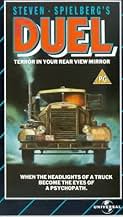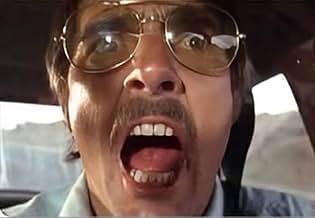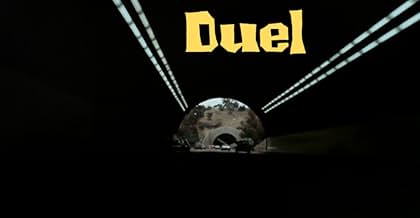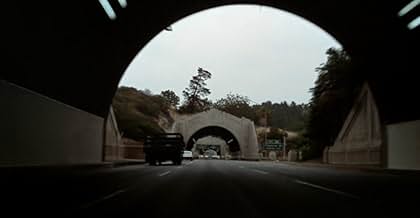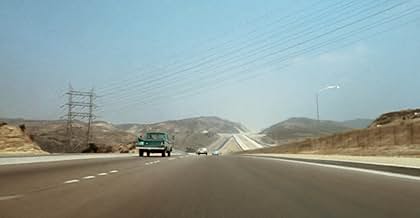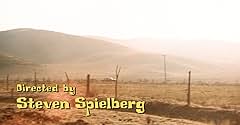Duel
- TV Movie
- 1971
- Tous publics
- 1h 30m
A business commuter is pursued and terrorized by the malevolent driver of a massive tractor-trailer.A business commuter is pursued and terrorized by the malevolent driver of a massive tractor-trailer.A business commuter is pursued and terrorized by the malevolent driver of a massive tractor-trailer.
- Won 1 Primetime Emmy
- 3 wins & 5 nominations total
Carey Loftin
- The Truck Driver
- (as Cary Loftin)
Dale Van Sickel
- Car Driver
- (as Dale VanSickle)
Lance Cormier
- Slow Man in Cafe
- (uncredited)
Chick Sheridan
- Old Man
- (uncredited)
Shawn Steinman
- Girl on school bus
- (uncredited)
Featured reviews
DUEL is Spielberg's JAWS of the highway, a raucous nascar race of a film that was "made for TV". Usually, the phrase made-for-TV makes me ill, but Universal TV executives had no clue what they had here. It was so good, the film got its fitting recognition in Europe, where it was released theatrically. Spielberg's own idol, director David Lean, praised the film's suspense and excitement. A testimonial from Sir David Lean is enough to get any career going. DUEL begins from the point of view of a driver, and never lets up. The fear Dennis Weaver encounters consists not only of the monster truck itself, which is on an unexpected death chase, but of the inability to see who (or what) is behind the wheel.
It seemed like a great episode of THE TWILIGHT ZONE, and Rod Serling would've been proud. Speed kills and you may never pass a slow truck on the highway again after seeing this. There is no character development, no humor, no identifiable characters, but in this case, who cares? It is only 90 minutes long and Spielberg's goal is to make you tired. To make you experience what this everyday salesman is going through for NO apparent reason. Besides a shark in the ocean, I really can't think of another more frightful situation to be in.
The truck itself is sinister looking, almost resembling one from RAIDERS OF THE LOST ARK. The only remnant of a human being in the truck is an arm. The arm waves much like the hitch-hiker in the famous TWILIGHT ZONE episode. Weaver is cheesy and silly looking in his Peter Fonda-esque shades, but it is a sign of the times. You don't necessarily find yourself rooting for him to escape alive. Basically, you are held prisoner by Spielberg's web of suspense, and stay wide-eyed the entire time. Great fun to watch on big or small screen.
RATING: 8 of 10
It seemed like a great episode of THE TWILIGHT ZONE, and Rod Serling would've been proud. Speed kills and you may never pass a slow truck on the highway again after seeing this. There is no character development, no humor, no identifiable characters, but in this case, who cares? It is only 90 minutes long and Spielberg's goal is to make you tired. To make you experience what this everyday salesman is going through for NO apparent reason. Besides a shark in the ocean, I really can't think of another more frightful situation to be in.
The truck itself is sinister looking, almost resembling one from RAIDERS OF THE LOST ARK. The only remnant of a human being in the truck is an arm. The arm waves much like the hitch-hiker in the famous TWILIGHT ZONE episode. Weaver is cheesy and silly looking in his Peter Fonda-esque shades, but it is a sign of the times. You don't necessarily find yourself rooting for him to escape alive. Basically, you are held prisoner by Spielberg's web of suspense, and stay wide-eyed the entire time. Great fun to watch on big or small screen.
RATING: 8 of 10
A brilliant study in minimalist suspense and terror
This film is the perfect example that you don't need a gigantic budget, sound names, great publicity or a little push from someone famous to create a cult classic. All it takes is talent and Spielberg has repeatedly shown us that he has plenty of it. It was filmed in a modest budget, the characters hardly talk and the plot is quite simple: it is the story of a man being chased in a highway by an truck. However it was filmed in such a way that it literally sticks you to the screen, never being boring for one second. The truck (not the driver) is the main protagonist of the story, a menacing character who chases a man to death for no particular reason. It plays marveously with our most intimate fear: the unknown. An absolute must see, a cult classic. this is a unique film.
This film is the perfect example that you don't need a gigantic budget, sound names, great publicity or a little push from someone famous to create a cult classic. All it takes is talent and Spielberg has repeatedly shown us that he has plenty of it. It was filmed in a modest budget, the characters hardly talk and the plot is quite simple: it is the story of a man being chased in a highway by an truck. However it was filmed in such a way that it literally sticks you to the screen, never being boring for one second. The truck (not the driver) is the main protagonist of the story, a menacing character who chases a man to death for no particular reason. It plays marveously with our most intimate fear: the unknown. An absolute must see, a cult classic. this is a unique film.
Its just about a road and two vehiciles but Steven Spielberg is a genius who made this simple story a thrilling journey. It was a treat to watch.
Although Dennis Weaver is probably best known for his two small screen TV series McCloud and Gunsmoke, there are those that hold out for his career role being the frightened and harassed driver in Duel.
Some years ago I was with two friends and a passenger in a car going on the Thruway in Upstate New York. Some idiot truckdriver thought we had offended him some how and chased us through several miles. We eluded him by going into a service station and driving around until he could not maneuver that big rig. I know exactly what Dennis Weaver was going through.
Weaver plays Mr. Average man on his way home from a business trip when some how he offends a faceless truckdriver whom we never see, but whose power behind that tanker truck we definitely feel right along with Weaver. Unless you're driving a bus you are no position to play turnpike tag with a big rig.
In the end Weaver decides he's so mad he stops being frightened and looks to take him down any way he can.
Weaver's performance is a one man tour de force. As much as Spencer Tracy in The Old Man And The Sea. One not to be missed.
Some years ago I was with two friends and a passenger in a car going on the Thruway in Upstate New York. Some idiot truckdriver thought we had offended him some how and chased us through several miles. We eluded him by going into a service station and driving around until he could not maneuver that big rig. I know exactly what Dennis Weaver was going through.
Weaver plays Mr. Average man on his way home from a business trip when some how he offends a faceless truckdriver whom we never see, but whose power behind that tanker truck we definitely feel right along with Weaver. Unless you're driving a bus you are no position to play turnpike tag with a big rig.
In the end Weaver decides he's so mad he stops being frightened and looks to take him down any way he can.
Weaver's performance is a one man tour de force. As much as Spencer Tracy in The Old Man And The Sea. One not to be missed.
From the opening credits, where we see a POV of David Mann's car pulling out of his driveway off to who-knows-where, the viewer knows their in for something special. Indeed, Duel is something special. It's essentially a 90 minute chase with the occasional brief intermissions for scenery change. This could get old really quick, and indeed it does get old . . . but I can't help but watch in amazement and observe how long Spielberg kept me engaged in just two vehicles on open roads.
And interestingly enough, ten minutes after the film started boring me it recaptured my interest for the breathtaking finale.
After Duel, the Creeper truck and the semi from JoyRide are pushovers. This is the Freddy Krueger of vehicles, and the truck (not its driver) is treated as the bad guy. I particularly loved when the truck was shot in silhouette through the tunnel - beautiful and haunting composition. Also the shots where the camera pulls around Mann's car and travels parallel up along the truck simply put, 'awesome cinematography.' The high number of interesting shots (on location, no less) of the truck chasing Mann is what really drives this film forward. It takes a long time for this particular flair and flavor of film to get boring.
Dennis Weaver plays his part of David extremely well; unfortunately, I didn't much care for the spineless middle-class Joe-shmo character on the page. I think part of my dislike comes from those annoying internal monologues that were totally unnecessary. It's always been a cheap gimmick in my mind, and Weaver truly communicates those emotions without the added soundtrack. Still, despite a character that I did not like, Duel managed to keep me engaged in the story . . . strangely enough.
Earlier I spoke of brief intermissions from the chase; notice I didn't say the tension is eased up here. Spielberg finds ways to lace these breathers with suspense through the presence of the truck (still, more to do with the truck itself than the driver). And really, it's through these intermissions that we meet other (very colorful) characters who make quite an impact considering their bit parts (then again, maybe it's due to the fact that juxtaposed to an empty desert any character is colorful).
I appreciate the lack of any real information, lack of a motive, lack of background story on Mann, very little info (if any) on Mann's destination. I do, however, think Spielberg went just a bit too far with the ambiguity; however, that's a very minor complaint that I don't care to dwell on. Sure a few points needed to be touched on more, but then again the Freddy Krueger of diesel trucks is chasing you, are you really going to stop and ask it a question?
I wish the character emotions had taken the same route instead of feeding the audience those redundant internal monologues. Oh well, there's a fun contrast for you.
In my review of T3, I wrote 'I wonder what director will be the first to direct the very first film composed solely of one action scene?' Spielberg comes pretty damn close, and the funny thing is his 60+ minutes of chase footage is more interesting than the new millennium's 10+ minute chases. Rock on Steven!
And interestingly enough, ten minutes after the film started boring me it recaptured my interest for the breathtaking finale.
After Duel, the Creeper truck and the semi from JoyRide are pushovers. This is the Freddy Krueger of vehicles, and the truck (not its driver) is treated as the bad guy. I particularly loved when the truck was shot in silhouette through the tunnel - beautiful and haunting composition. Also the shots where the camera pulls around Mann's car and travels parallel up along the truck simply put, 'awesome cinematography.' The high number of interesting shots (on location, no less) of the truck chasing Mann is what really drives this film forward. It takes a long time for this particular flair and flavor of film to get boring.
Dennis Weaver plays his part of David extremely well; unfortunately, I didn't much care for the spineless middle-class Joe-shmo character on the page. I think part of my dislike comes from those annoying internal monologues that were totally unnecessary. It's always been a cheap gimmick in my mind, and Weaver truly communicates those emotions without the added soundtrack. Still, despite a character that I did not like, Duel managed to keep me engaged in the story . . . strangely enough.
Earlier I spoke of brief intermissions from the chase; notice I didn't say the tension is eased up here. Spielberg finds ways to lace these breathers with suspense through the presence of the truck (still, more to do with the truck itself than the driver). And really, it's through these intermissions that we meet other (very colorful) characters who make quite an impact considering their bit parts (then again, maybe it's due to the fact that juxtaposed to an empty desert any character is colorful).
I appreciate the lack of any real information, lack of a motive, lack of background story on Mann, very little info (if any) on Mann's destination. I do, however, think Spielberg went just a bit too far with the ambiguity; however, that's a very minor complaint that I don't care to dwell on. Sure a few points needed to be touched on more, but then again the Freddy Krueger of diesel trucks is chasing you, are you really going to stop and ask it a question?
I wish the character emotions had taken the same route instead of feeding the audience those redundant internal monologues. Oh well, there's a fun contrast for you.
In my review of T3, I wrote 'I wonder what director will be the first to direct the very first film composed solely of one action scene?' Spielberg comes pretty damn close, and the funny thing is his 60+ minutes of chase footage is more interesting than the new millennium's 10+ minute chases. Rock on Steven!
Did you know
- TriviaAccording to Richard Matheson, he was inspired to write the original short story "Duel" after an encounter with a tailgating truck driver on November 22, 1963, the day that John F. Kennedy was assassinated.
- GoofsWhen Mann approaches the phone booth at the "Snakerama" he says "Odd place for a telephone booth," and gets inside, closing the door behind him. The camera pans to the right slightly, revealing the reflection of Steven Spielberg in the lower right-hand side of the glass panel, wearing what appears to be a blue Hawaiian shirt, glancing up and down at the script in his hands. Behind him, the truck's reflection can also be seen.
- Quotes
David Mann: You can't beat me on the grade. You can't beat me on the grade!
- Crazy creditsA scene plays out over the credits where David Mann sits on the edge of the cliff throwing stones.
- Alternate versionsFor the German DVD release, the film was entirely redubbed.
- ConnectionsEdited into L'incroyable Hulk: Never Give a Trucker an Even Break (1978)
- SoundtracksBrush Those Tears from Your Eyes
(uncredited)
Written by Al Trace (as Clem Watts), Oakley Haldeman and James Lee
Published by MCA Music (ASCAP)
- What are the differences between the VHS and the DVD versions?
Details
Box office
- Budget
- $450,000 (estimated)
- Gross worldwide
- $2,544
- Runtime1 hour 30 minutes
- Color
Contribute to this page
Suggest an edit or add missing content



